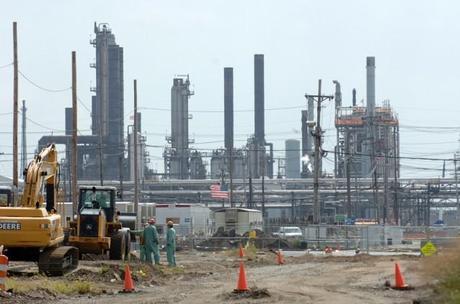 from Climate Progress
from Climate Progress
A fire broke out at BP’s largest U.S. refinery on Wednesday night after a compressor exploded in one of the refinery’s units, sending shakes through local homes and injuring one worker, according to media reports.
The explosion is the latest mishap at the company’s Whiting Refinery in Whiting, Indiana, which in March was responsible for leaking up to 1,638 gallons of oil into Lake Michigan. That incident occurred less than two weeks after the U.S. lifted BP’s ban on seeking new oil leases in the Gulf of Mexico.
The Whiting refinery is a huge operation, producing up to 423,500 barrels of oil every day. It’s the seventh-largest refinery in the United States, and was recently upgraded to process oil from the Canadian tar sands.
BP said it had contained the fire as of Thursday morning, and that the plant continued to operate.
The plant itself has drawn opposition from environmentalists because of its proximity to Lake Michigan, which supplies drinking water for seven million people in the Chicago area alone.
EPA officials said there were no indications that drinking water was threatened from the March spill, which took about a week to clean up. The Times of Northwest Indiana reported that The Lake County office overseeing stormwater drainage had required BP provide data from the spill and copies of its own internal investigation, but other than that it’s currently unclear whether BP will face penalties from that incident.
The Whiting refinery was also at the center of another controversy in April, when Chicago residents filed a class action lawsuit against BP over the tar sands refining byproduct produced at the plant — a black, dusty substance called petroleum coke.
Residents sued BP for selling its petroleum coke to Koch Industries, which the lawsuit says stored the byproduct in huge piles along the Calumet river. The residents allege that black, chalky dust from the uncovered piles is blowing into their communities and covering their homes and playgrounds, presenting a serious health risk.
“One of the women here is a mother with children, and when the wind blows her house is covered with this soot,” Rolanda Watson-Clark, a nurse, told ThinkProgress following a May rally calling on Mayor Rahm Emanuel put a stop to petcoke storage in Chicago. “Her five-year-old even knows that when it’s windy, she can’t go out and play.”
The Whiting refinery currently produces about 600,000 tons per year of petcoke, but the recent $3.8 billion expansion has the potential to up its petcoke production to 2.2 million tons per year.

